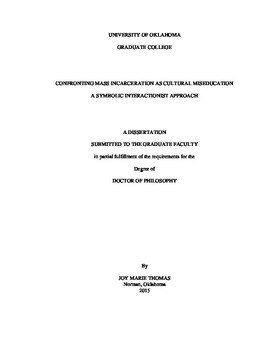| dc.contributor.advisor | Vaughn, Courtney | |
| dc.contributor.author | Thomas, Joy | |
| dc.date.accessioned | 2015-06-05T15:26:36Z | |
| dc.date.available | 2015-06-05T15:26:36Z | |
| dc.date.issued | 2015-05-08 | |
| dc.identifier.uri | https://hdl.handle.net/11244/14667 | |
| dc.description.abstract | When strong expectations for societal compliance to societal ills, including miseducation, result in mass incarceration of disenfranchised communities; suffering can occur. The more acerbic the incarceration; the greater the injury. Yet, as research and emerging data will bear witness to, some ex-prisoners who experience incarceration do achieve psychological freedom and victory on varying levels.
This is a study about mass incarceration and how the United States imprisons more people per capita than any other country. Imprisoning exorbitant amounts of human capital means imprisoning whole communities – particularly communities of color. Self-determination theory, social learning theory and adult education theory are used as the milieu for data collected from minority male ex-prisoners who managed not to re-offend and who achieve success after release from prison. The aim of the study is to confirm or disconfirm the aforementioned theories while usage of symbolic interaction as the methodology situates this research.
Studies combining a three-prong theoretical approach to understanding ex offender success after being released from prison are lacking. It is the goal of this study to add this body of research through multifaceted interpretation of interviews to illuminate the voices of those not often in the conversation of educational reform. The collective growth serves an educative purpose because it assists in informing and increasing awareness to the unforgiving laws after a person has paid his debt to society. Implications of this study aspire to inform best teaching practices for curriculum development and classroom management. | en_US |
| dc.language | en_US | en_US |
| dc.subject | Mass Incarceration, Restorative Practice, School to Prison Pipeline, Miseducation | en_US |
| dc.title | Confronting Mass Incarceration as Cultural Miseducation: A Symbolic Interactionist Approach | en_US |
| dc.contributor.committeeMember | Covaleskie, John | |
| dc.contributor.committeeMember | Houser, Neil | |
| dc.contributor.committeeMember | Dancy, T. Elon | |
| dc.contributor.committeeMember | Hufnagel, Glenda | |
| dc.date.manuscript | 2015-05-08 | |
| dc.thesis.degree | Ph.D. | en_US |
| ou.group | Jeannine Rainbolt College of Education::Department of Educational Leadership and Policy Studies | en_US |
